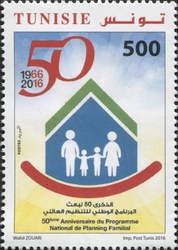Stamp: Commemoration of the 50th Anniversary of the National Program of Family Planning (Tunisia 2016)
Commemoration of the 50th Anniversary of the National Program of Family Planning (Tunisia 2016)
13 October (Tunisia ) within release Commemoration of the 50th Anniversary of the National Program of Family Planning goes into circulation Stamp Commemoration of the 50th Anniversary of the National Program of Family Planning face value 0.50 Tunisian dinar
| Stamp Commemoration of the 50th Anniversary of the National Program of Family Planning in catalogues | |
|---|---|
| WADP Numbering System - WNS: | WAD:TN018.16 |
Stamp is vertical format.
Number in set - 1|. Layout - sheet of 28. Issuing - Office National des Postes Tunisie. Printer - Imprimerie des timbres-poste de la TunisieStamp Commemoration of the 50th Anniversary of the National Program of Family Planning it reflects the thematic directions:
A medication (also called medicament, medicine, pharmaceutical drug, medicinal drug or simply drug) is a drug used to diagnose, cure, treat, or prevent disease. Drug therapy (pharmacotherapy) is an important part of the medical field and relies on the science of pharmacology for continual advancement and on pharmacy for appropriate management.
A woman is an adult female human. Before adulthood, a woman is referred to as a girl (a female child or adolescent)
Humans (Homo sapiens, meaning "thinking man") or modern humans are the most common and widespread species of primate, and the last surviving species of the genus Homo. They are great apes characterized by their hairlessness, bipedalism, and high intelligence. Humans have large brains, enabling more advanced cognitive skills that enable them to thrive and adapt in varied environments, develop highly complex tools, and form complex social structures and civilizations. Humans are highly social, with individual humans tending to belong to a multi-layered network of cooperating, distinct, or even competing social groups – from families and peer groups to corporations and political states. As such, social interactions between humans have established a wide variety of values, social norms, languages, and traditions (collectively termed institutions), each of which bolsters human society. Humans are also highly curious, with the desire to understand and influence phenomena having motivated humanity's development of science, technology, philosophy, mythology, religion, and other frameworks of knowledge; humans also study themselves through such domains as anthropology, social science, history, psychology, and medicine. There are estimated to be more than eight billion living humans.


